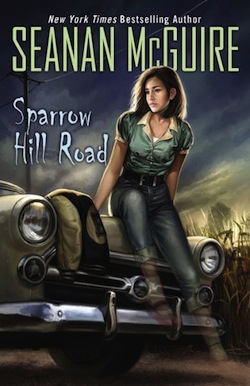I’ve lost track of how many novels the amazingly prolific Seanan McGuire, and her alter ego Mira Grant, have published between them. Suffice to say that at this point, McGuire’s had a great deal of practice, and it shows.
Sparrow Hill Road is her latest book, set in the same universe as her InCryptid series but not featuring any overlap with characters or events introduced in those novels. It is more a collection of linked stories than a single unified novel—which makes sense, because Sparrow Hill Road originated as a series of short stories first published at Edge of Propinquity in 2010. These are the stories of Rose Marshall, dead at the age of sixteen in 1954, killed by a man called Bobby Cross who made a deal at the crossroads to live forever.
She’s been wandering America’s highways as a ghost ever since.
(Some spoilers ahead.) There is nothing in European culture that approaches the equivalent of the influence of the highway, and the car, on the American imagination. Sparrow Hill Road is peculiarly American: Rose Marshall (like Lee Child’s Jack Reacher) could exist nowhere else. Reading it from a small town in the suburbs of Dublin, Ireland, I’m conscious of reading a narrative that is playing with tools and tropes from the legendarium of an entirely alien country. This sense of alienation means I may judge it more harshly, or miss more of the conversation it is having, than someone whose native culture is middle America. (Hell, than someone who drives a car.)
Sparrow Hill Road is told from Rose’s point of view. The first-person voice is very reminiscent of McGuire’s other work: not much distinguishes the matter-of-fact voice of Toby Daye, or of Verity Price—or, for that matter, of Velveteen—from 1930s-born Rose Marshall. As always, though, it’s a very readable narrative voice. The book is divided in four sections: “Campfire Stories” introduces us to Rose Marshall, hitchhiking ghost and occasional psychopomp, and to her world; “Ghost Stories” broadens and deepens that world and our understanding of Rose’s character; “Scary Stories” and “True Stories” bring matters around to more closely connect with Rose’s personal history, with the man who killed her, and with her desire both for revenge and to prevent Bobby Cross from claiming any more victims.
As a whole, the narrative doesn’t proceed in a linear fashion, but the closer we come to the climax of the linked stories, the more linear the sequence of events becomes. That climax is a confrontation between Rose Marshall and Bobby Cross, a race on the same stretch of road where Rose died, with the souls of Rose, her best friend, and her only boyfriend at stake. Mind you, winning doesn’t mean Bobby Cross is vanquished. There are, one suspects, more stories of Rose to come…
There are problems involved in putting together a book of linked short stories, or of a serial. While McGuire controls her narrative sufficiently that any disjointedness in the overarching storyline feels intentional rather than haphazard, there is a certain amount of repetition. Rose speaks directly to the audience, and when she’s speaking about how her ghost highways work, or her experience of her afterlife, from story to story we receive the same information in very similar style. This lead to me occasionally skipping whole paragraphs to get to the meat of the matter.
That said, McGuire’s twilight America contains some strikingly strong mythic resonances, and its atmosphere occasionally rises from passingly creepy to truly eerie. It’s not a book that stirs strong feelings in me—it’s fun, not terribly complex, and easily read—but fans of McGuire’s other work will find an entertaining read here. And fans of highways and American ghost stories will also find something to enjoy.
Sparrow Hill Road is available May 6th from DAW.
Liz Bourke is a cranky person who reads books. Her blog. Her Twitter.











Eh, the original Rose in the Edge of Propinquity series actually did have a distinctive voice. I was really looking forward to this title until I read one of the InCryptid stories featuring the new, sassy Rose who sounds just like Verity and co. I’ll probably still read it, but I’ll wait for the library instead of buying it.